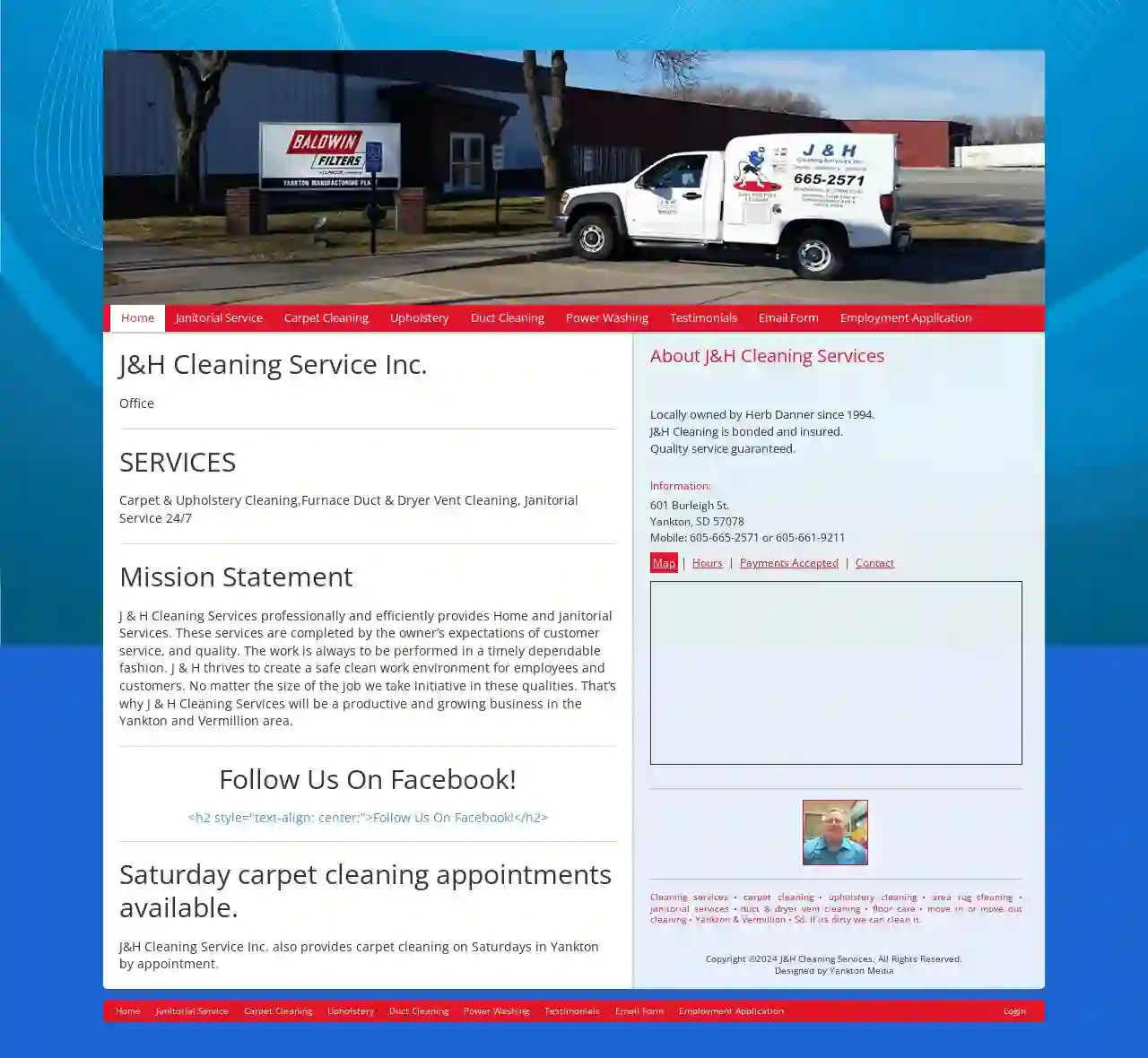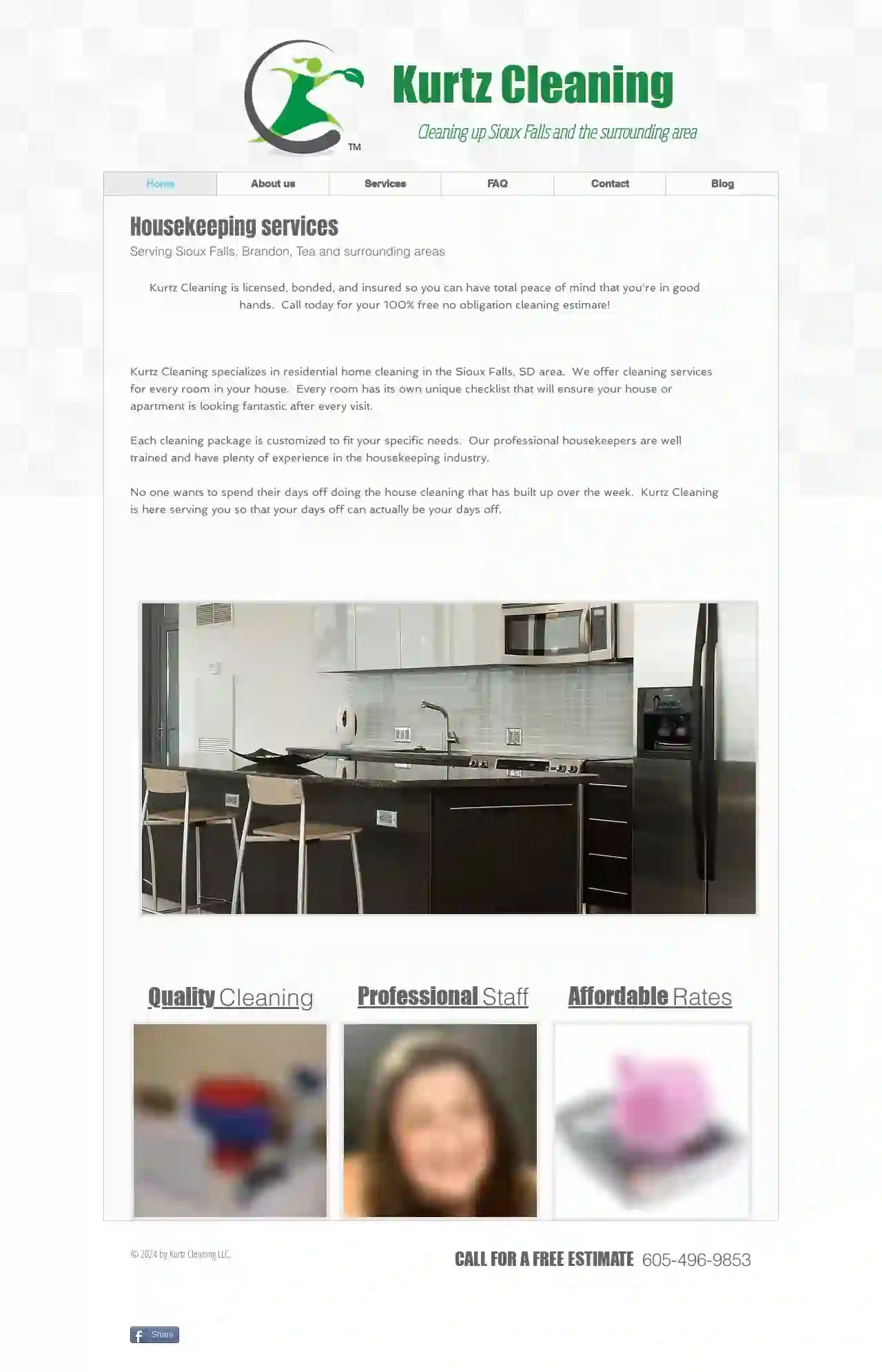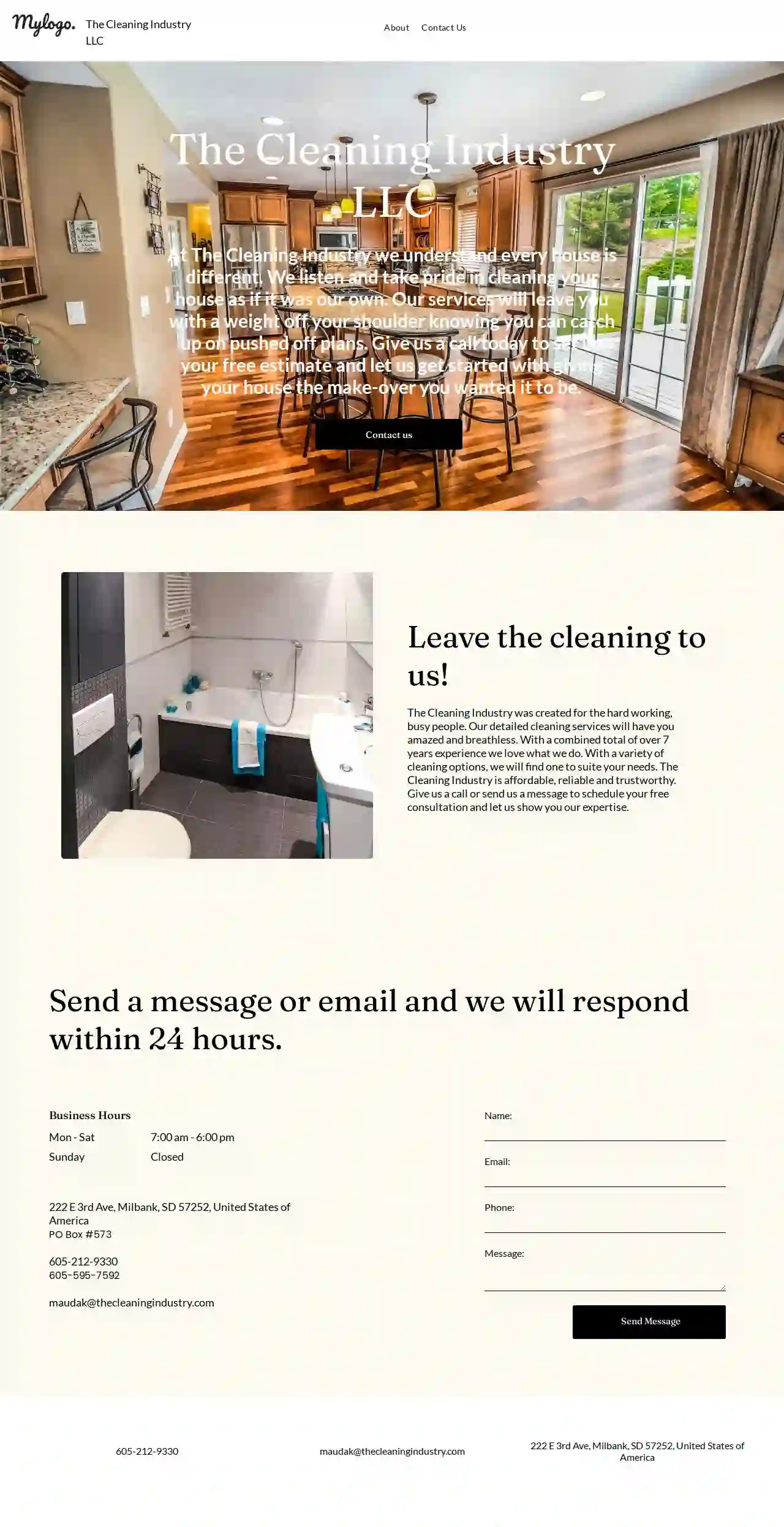Cleaning Services Brookings
Find top Professional Cleaners in Brookings
Get multiple Cleaning Companies quotes for your project today! Compare profiles, reviews, accreditations, portfolio, etc... and choose the best offer.
Service Needed
City or Town

Centra Cleaning Company
51 reviewsSioux Falls, US- Services
- Why Us?
Get Quote
J & H Cleaning Services Inc.
4.726 reviewsSioux Falls, US- Services
- Why Us?
Get Quote
Brenda's Cleaning Services
56 reviewsSioux Falls, US- Services
- Why Us?
Get Quote
FilterShine South Dakota
52 reviewsSioux Falls, US- Services
- Why Us?
Get Quote
Automated Maintenance Systems
4.117 reviewsSioux Falls, US- Services
- Why Us?
Get Quote
Kurtz Cleaning
53 reviewsSioux Falls, US- Services
- Why Us?
Get Quote
Premiere Office Cleaning
57 reviewsSioux Falls, US- Services
- Why Us?
Get Quote
Peppermint Cleaning Services
427 reviewsSioux Falls, US- Services
- Why Us?
Get Quote
The Cleaning Industry LLC
52 reviewsSioux Falls, US- Services
- Why Us?
Get Quote
Optimal Prime Cleaning Services
521 reviewsSioux Falls, US- Services
- Why Us?
Get Quote
Over 60,241+ Cleaning Services in our network
Our janitorial pros operate in Brookings and surroundings!
CleaningMatch has curated and vetted the Best Cleaning Services near Brookings. Find the most trustworthy contractor today.
Frequently Asked Questions About Cleaning Services
Find answers to common questions about cleaning services and hiring cleaning companies in the USA.
- Prepare the Windows: Remove dust and debris from windows using a brush, vacuum, or damp cloth.
- Cleaning Solution: Use a commercial glass cleaner or a homemade solution of equal parts water and vinegar.
- Spray and Wipe: Spray the cleaning solution onto the window, ensuring even coverage.
- Squeegee Technique: Use a squeegee to wipe the cleaner from top to bottom, overlapping each stroke by about an inch. Wipe the squeegee blade clean after each stroke.
- Dry Edges: Wipe the edges of the window with a clean, dry microfiber cloth to remove any remaining moisture.
- Type of cleaning: Deep cleaning, regular cleaning, move-in/move-out cleaning, and specialized cleaning (e.g., carpet cleaning) have different price points.
- Size of the property: Larger properties typically require more time and resources, resulting in higher costs.
- Frequency of cleaning: Regular cleaning schedules often have discounted rates compared to one-time services.
- Location: Cleaning costs can differ based on regional labor costs and demand.
- Additional services: Extra tasks, such as window cleaning, laundry, or organization, will add to the overall price.
- Ventilation: Open windows and turn on the exhaust fan to improve air circulation.
- Declutter: Remove any items from countertops, the shower, and the floor to allow easy access.
- Pre-treat: Spray shower walls, tub, and toilet bowl with bathroom cleaner and let it sit for a few minutes to break down grime.
- Toilet: Scrub the toilet bowl with a toilet brush, paying attention to the rim and under the seat. Wipe down the exterior of the toilet with a disinfectant wipe.
- Shower/Tub: Scrub the shower walls and tub with a sponge or scrub brush. Rinse thoroughly.
- Sink: Clean the sink with a sponge or cloth and bathroom cleaner. Pay attention to the faucet and drain.
- Mirrors and Glass: Wipe down mirrors and glass surfaces with a glass cleaner and a microfiber cloth for a streak-free finish.
- Floors: Sweep or vacuum the floor, then mop with a floor cleaner designed for your bathroom floor type.
- Finishing Touches: Empty the trash can, replace towels, and put away any toiletries.
- Regular dusting: Dust frequently using microfiber cloths or a duster. Pay attention to surfaces that attract dust, such as shelves, electronics, and furniture.
- Vacuuming: Vacuum carpets and rugs regularly using a vacuum cleaner with a HEPA filter to trap dust mites and allergens.
- Air Purifier: Consider using an air purifier to remove dust particles and allergens from the air.
- Reduce Clutter: Clutter provides more surfaces for dust to settle. Declutter regularly to minimize dust traps.
- Window Treatments: Wash or vacuum window treatments, such as curtains or blinds, regularly to remove dust buildup.
- Bedding: Wash bedding, including sheets, pillowcases, and blankets, weekly in hot water to remove dust mites.
- Doormats: Place doormats at entrances to trap dirt and dust from shoes before they enter your home.
What is the best way to clean windows without streaks?
Achieving streak-free windows requires the right technique and cleaning solutions. Follow these steps:
For best results, clean windows on a cloudy day or in the shade to prevent the cleaning solution from drying too quickly and leaving streaks.
For best results, clean windows on a cloudy day or in the shade to prevent the cleaning solution from drying too quickly and leaving streaks.
How much do cleaning services cost in the USA?
Cleaning service costs in the USA vary based on several factors, including:
To get accurate pricing, request personalized quotes from reputable cleaning services on CleaningMatch. They will assess your specific needs and provide a tailored cost estimate.
To get accurate pricing, request personalized quotes from reputable cleaning services on CleaningMatch. They will assess your specific needs and provide a tailored cost estimate.
What is the best way to clean a bathroom?
Cleaning a bathroom effectively involves targeting key areas and using the right cleaning products. Here's a step-by-step guide:
By following these steps, you can maintain a clean and hygienic bathroom.
By following these steps, you can maintain a clean and hygienic bathroom.
How do I prevent dust from accumulating in my home?
Dust is a common household nuisance, but several preventive measures can minimize its accumulation:
By implementing these preventive measures, you can significantly reduce dust accumulation and maintain a cleaner and healthier home.
By implementing these preventive measures, you can significantly reduce dust accumulation and maintain a cleaner and healthier home.
What is the best way to clean windows without streaks?
Achieving streak-free windows requires the right technique and cleaning solutions. Follow these steps:
For best results, clean windows on a cloudy day or in the shade to prevent the cleaning solution from drying too quickly and leaving streaks.
- Prepare the Windows: Remove dust and debris from windows using a brush, vacuum, or damp cloth.
- Cleaning Solution: Use a commercial glass cleaner or a homemade solution of equal parts water and vinegar.
- Spray and Wipe: Spray the cleaning solution onto the window, ensuring even coverage.
- Squeegee Technique: Use a squeegee to wipe the cleaner from top to bottom, overlapping each stroke by about an inch. Wipe the squeegee blade clean after each stroke.
- Dry Edges: Wipe the edges of the window with a clean, dry microfiber cloth to remove any remaining moisture.
For best results, clean windows on a cloudy day or in the shade to prevent the cleaning solution from drying too quickly and leaving streaks.
How much do cleaning services cost in the USA?
Cleaning service costs in the USA vary based on several factors, including:
To get accurate pricing, request personalized quotes from reputable cleaning services on CleaningMatch. They will assess your specific needs and provide a tailored cost estimate.
- Type of cleaning: Deep cleaning, regular cleaning, move-in/move-out cleaning, and specialized cleaning (e.g., carpet cleaning) have different price points.
- Size of the property: Larger properties typically require more time and resources, resulting in higher costs.
- Frequency of cleaning: Regular cleaning schedules often have discounted rates compared to one-time services.
- Location: Cleaning costs can differ based on regional labor costs and demand.
- Additional services: Extra tasks, such as window cleaning, laundry, or organization, will add to the overall price.
To get accurate pricing, request personalized quotes from reputable cleaning services on CleaningMatch. They will assess your specific needs and provide a tailored cost estimate.
What is the best way to clean a bathroom?
Cleaning a bathroom effectively involves targeting key areas and using the right cleaning products. Here's a step-by-step guide:
By following these steps, you can maintain a clean and hygienic bathroom.
- Ventilation: Open windows and turn on the exhaust fan to improve air circulation.
- Declutter: Remove any items from countertops, the shower, and the floor to allow easy access.
- Pre-treat: Spray shower walls, tub, and toilet bowl with bathroom cleaner and let it sit for a few minutes to break down grime.
- Toilet: Scrub the toilet bowl with a toilet brush, paying attention to the rim and under the seat. Wipe down the exterior of the toilet with a disinfectant wipe.
- Shower/Tub: Scrub the shower walls and tub with a sponge or scrub brush. Rinse thoroughly.
- Sink: Clean the sink with a sponge or cloth and bathroom cleaner. Pay attention to the faucet and drain.
- Mirrors and Glass: Wipe down mirrors and glass surfaces with a glass cleaner and a microfiber cloth for a streak-free finish.
- Floors: Sweep or vacuum the floor, then mop with a floor cleaner designed for your bathroom floor type.
- Finishing Touches: Empty the trash can, replace towels, and put away any toiletries.
By following these steps, you can maintain a clean and hygienic bathroom.
How do I prevent dust from accumulating in my home?
Dust is a common household nuisance, but several preventive measures can minimize its accumulation:
By implementing these preventive measures, you can significantly reduce dust accumulation and maintain a cleaner and healthier home.
- Regular dusting: Dust frequently using microfiber cloths or a duster. Pay attention to surfaces that attract dust, such as shelves, electronics, and furniture.
- Vacuuming: Vacuum carpets and rugs regularly using a vacuum cleaner with a HEPA filter to trap dust mites and allergens.
- Air Purifier: Consider using an air purifier to remove dust particles and allergens from the air.
- Reduce Clutter: Clutter provides more surfaces for dust to settle. Declutter regularly to minimize dust traps.
- Window Treatments: Wash or vacuum window treatments, such as curtains or blinds, regularly to remove dust buildup.
- Bedding: Wash bedding, including sheets, pillowcases, and blankets, weekly in hot water to remove dust mites.
- Doormats: Place doormats at entrances to trap dirt and dust from shoes before they enter your home.
By implementing these preventive measures, you can significantly reduce dust accumulation and maintain a cleaner and healthier home.